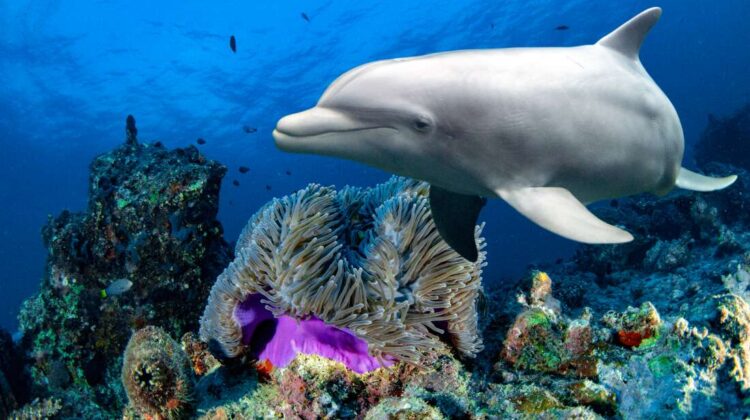
Self-medication is surprisingly common in the animal kingdom. Many creatures have evolved to employ materials from their surroundings to cure their illnesses, ranging from ants and bees to orangutans, chimps, and – obviously – humans.
Bottlenose dolphins appear to have joined the queue at nature’s pharmacy, as they have been photographed lining up to rub themselves against corals in an apparent attempt to heal skin ailments. The discoveries, published in Parasitology, are the result of the dedication of Angela Ziltener, a wildlife scientist at the University of Zurich, who ventured to the water to win the dolphins’ confidence so that she could observe their behavior up close.
Their proclivity for rubbing up against corals was discovered 13 years ago when Ziltener observed a pod of Indo-Pacific bottlenose dolphins rubbing up against coral in Egypt’s Northern Red Sea.
“This coral rubbing activity has never been documented previously, and it was evident that the dolphins understood exactly which coral they wanted to utilize,” Ziltener said in a release. “I reasoned, ‘There must be a reason.'”
After being welcomed by the dolphins, Ziltener and colleagues were able to see which corals the dolphins were rubbing against and the impact this was having on both the animals and the reef species. They noticed that the abrasive action of scraping against the coral was upsetting the invertebrate polyps that dwell within it, causing them to churn forth mucus.
With the coral samples in hand, the researchers returned to the lab so that lead author Gertrud Morlock, an analytical chemist at Germany’s Justus Liebig University Giessen, could assess the items they were hiding. They brought back gorgonian coral (Rumphella aggregata), leather coral (Sarcophyton sp.), and sponges (Ircinia sp.).
In the lab, the trio of reef species produced 17 active metabolites with antibacterial, antioxidative, hormonal, and poisonous activities. Dolphins may be using bioactive substances in coral species’ exudates to make their skin happy, similar to how we humans like to apply snail mucus on our faces.
“Repeated rubbing brings the active metabolites into touch with the dolphins’ skin,” Morlock explained. “These metabolites may aid in skin homeostasis and be effective for prophylactic or supplementary therapy against microbial infections.”

Morlock compares the dolphins’ usage of the coral rub station to washing or brushing their teeth, since the dolphins top up on mucus scrubs throughout the day.
The researchers hope to continue studying the behavior to better understand what conditions or body parts the various coral rubs can treat, but they are concerned that the pod and other dolphins are under threat from the increasing disturbance caused by tourist groups wanting to swim with the animals recreationally.
“The tourist sector now earns a lot of money off of dolphin swimming,” Ziltener explained, “so they’re figuring out which reefs they utilize and upsetting the dolphins if they don’t follow the standards for how to approach them responsibly.”
Her work with the Dolphin Watch Alliance, a conservation organization, aims to educate tour companies so that reefs and the species that live on them may obtain the required protection to fund further study and, most importantly, ensure the animals’ futures.

I love the dolphins.this is amazing